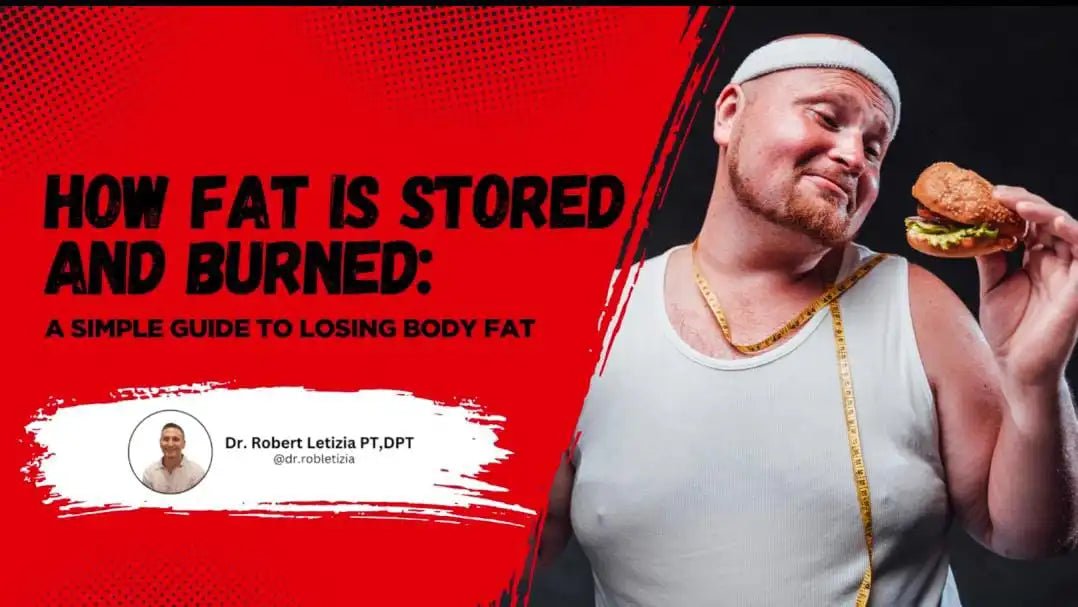
How Fat Is Stored—and Burned: A Simple Guide to Losing Body Fat That Actually Works
Dr. Rob Letizia PT, DPTShare
If you're finding fat loss more challenging as you age, especially after 40, you're not alone. Understanding how your body stores and burns fat is crucial to developing effective strategies for weight management. This guide provides clear, actionable advice tailored for those over 40, focusing on methods that work.
What Causes Fat Storage?
Your body stores fat when you consume more calories than you expend. However, it's not solely about calorie intake; hormonal responses, particularly involving insulin, play a significant role.
Here’s how fat storage works:
-
Consumption of Carbohydrates and Sugars: Eating foods high in carbs or sugars raises blood sugar levels.
-
Insulin Release: The pancreas releases insulin to help cells absorb glucose.
-
Energy Storage: Excess glucose is stored as fat.
Consistently high insulin levels, often due to frequent snacking or high-carb diets, can promote continuous fat storage and hinder fat burning. [Learn more about insulin and fat storage].
How Does Fat Burning Work?
To burn fat, your body must tap into stored energy, which occurs when:
-
Insulin Levels Are Low: Lower insulin levels facilitate fat breakdown.
-
Caloric Deficit: Consuming fewer calories than you burn prompts the body to use stored fat for energy.
-
Regular Physical Activity: Consistent movement and appropriate exercise types enhance fat burning.
Simply reducing calorie intake or increasing cardio isn't always effective; creating the right internal conditions is essential [Read more on the science of fat burning].
Effective Strategies to Burn Body Fat
Implement these fundamental strategies to aid fat loss:
-
Walk 10,000 Steps Daily
Walking helps regulate blood sugar, burns calories, reduces stress, and enhances fat-burning without overburdening the body [Studies show walking helps with fat loss]. -
Incorporate Protein into Every Meal
Protein supports muscle maintenance and promotes satiety. It also requires more energy to digest compared to carbohydrates or fats. Aim for 30–40 grams per meal to support muscle and metabolism [Protein and fat loss]. -
Engage in Strength Training 2–4 Times Weekly
Muscle tissue increases resting metabolic rate. Regular strength training helps preserve muscle mass, which naturally declines with age [Strength training boosts metabolism]. -
Reduce Snacking and Sugary Foods
Frequent eating, especially of sugary items, keeps insulin levels elevated, promoting fat storage. Limiting meals to 2–3 per day with balanced nutrients can help manage insulin levels [Understanding insulin and fat storage]. -
Prioritize 7–9 Hours of Sleep Per Night
Inadequate sleep can increase cravings, elevate stress hormones, and impede fat loss. Ensuring sufficient rest supports overall health and weight management [The role of sleep in fat loss]. -
Incorporate Short, Intense Workouts 1–2 Times Per Week
High-intensity sessions, such as incline walking or sprint intervals, can boost fat-burning hormones and metabolism [HIIT for fat loss].
Why Fat Loss Becomes More Challenging After 49
Aging brings hormonal changes that affect metabolism:
-
Hormonal Shifts: Levels of hormones like testosterone and estrogen decrease.
-
Muscle Mass Decline: Muscle strength can decline significantly after 40.
-
Reduced Insulin Sensitivity: The body becomes more prone to storing fat.
These factors necessitate adjusted strategies for effective fat loss.
Effective Strategies After 49
To counteract age-related changes:
-
Consistent Strength Training: Maintains muscle mass and boosts metabolism.
-
Daily Walking: Aim for 10,000 steps to support cardiovascular health and weight management.
-
Increased Protein Intake: Supports muscle preservation and overall health.
-
Quality Sleep and Stress Management: Essential for hormonal balance and recovery.
-
Avoid Excessive Cardio: Long sessions can lead to muscle loss; focus on strength and interval training.
The Bottom Line: Fat Loss Is a Methodical Process
Achieving and maintaining fat loss involves:
-
Stable Blood Sugar Levels
-
Lower Insulin Levels
-
Increased Muscle Mass
-
Adequate Recovery
-
Balanced Nutrition
For those over 49, adhering to these principles is crucial.
Achieve Lasting Results with Expert Guidance
At Spectrum Therapeutics of NJ, we specialize in creating personalized fat-loss and strength-building plans tailored to individuals over 40. Our approach considers your unique hormonal profile and lifestyle to deliver effective, sustainable results.
Whether you're beginning your journey or seeking to overcome plateaus, we're here to provide clarity and support.
👉 Schedule a consultation today, and let's build a plan that works for your body.



